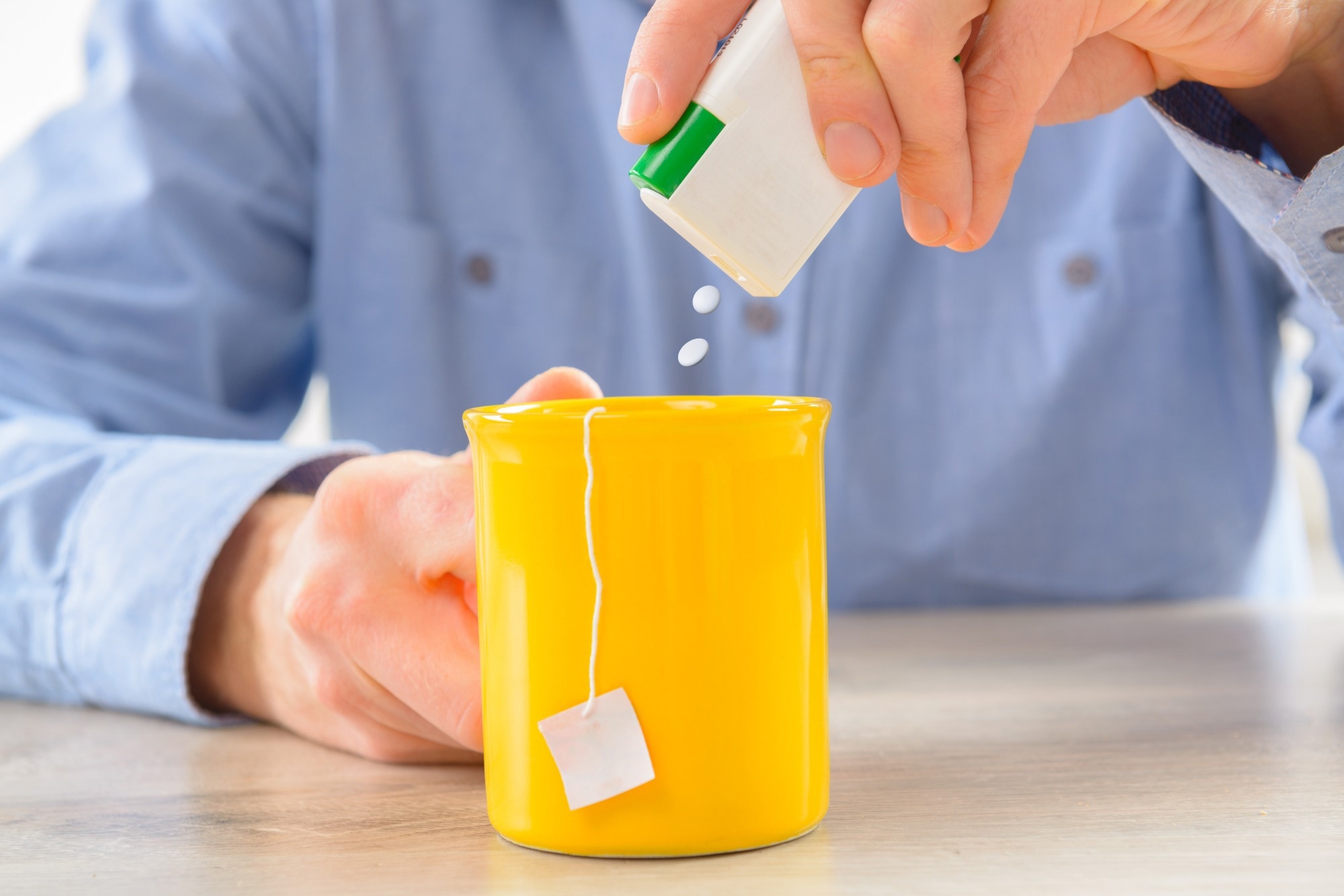In a recent study published in the British Medical Journal, researchers investigated the relationship between the intake of artificial sweeteners and the risk of all cardiovascular diseases (CVDs), including cardiometabolic disorders.
The researchers studied artificial sweeteners from all dietary sources, such as sweetened beverages, tabletop sweeteners, and dairy products. Additionally, they examined their molecular composition, i.e., aspartame, acesulfame potassium, and sucralose.
 Study: Artificial sweeteners and risk of cardiovascular diseases: results from the prospective NutriNet-Santé cohort. Image Credit: Monika Wisniewska / Shutterstock
Study: Artificial sweeteners and risk of cardiovascular diseases: results from the prospective NutriNet-Santé cohort. Image Credit: Monika Wisniewska / Shutterstock
Background
Artificial sweeteners are an alternative to sugar but have much-reduced calorie content than free sugar. With a current $7.2 billion market globally and a 5% annual growth, artificial sweeteners are projected to attain $9.7 billion by 2028. They are present in several food and beverage brands worldwide. However, there is not enough data suggesting the acceptable daily intake of each artificial sweetener. Nonetheless, they are currently undergoing a reevaluation by several health agencies, including the European Food Safety Authority (EFSA) and the United States Food and Drug Administration (FDA).
About the study
In the present study, researchers enrolled 103,388 participants of the NutriNet-Santé cohort in France to assess their dietary intakes and consumption of artificial sweeteners. They recorded their interactive web-based 24 hours dietary records repeatedly, including brand names of industrial products.
Further, the team used multivariable-adjusted Cox hazard models to assess a correlation between sweeteners and the risk of developing CVDs. They computed each type of cerebrovascular or coronary disease event separately, including myocardial infarction, angioplasty, angina pectoris, stroke, acute coronary syndrome, and transient ischaemic event. Further, they investigated associations between the CVD risk and artificial sweeteners from beverages and solid food. They used both self-reported and medico-administrative data for the identification of CVD outcomes.
For statistic computation of continuous models, the researchers log-transformed (log10 of sweetener consumption in mg/g+1) artificial sweetener intakes. Then, they used the continuous model as the primary analysis to obtain hazard ratios (HRs) and 95% confidence intervals (CIs). Finally, the team performed a sensitivity analysis on the subset of participants with a minimum of four dietary records, which doubled the minimum number of 24 h dietary records.
Study findings
In the NutriNet-Santé cohort, 37.1% of participants consumed artificial sweeteners. The mean intake of all participants and consumers was 15.76 mg/day and 42.46 mg/day, respectively. The contribution of aspartame, acesulfame potassium, and sucralose to total artificial sweetener intakes was 58%, 29%, and 10%, respectively. Soft drinks, tabletop sweeteners, and flavored dairy products accounted for 53%, 30%, and 8% of artificial sweetener intakes.
The authors noted 1,502 incident cardiovascular events during a median follow-up duration of nine years. Of these, there were 730 coronary heart disease events and 777 cerebrovascular disease events. Further, they observed a correlation between total artificial sweetener intake and increased CVD risk, with an HR of 1.09, 95% CI. Notably, substituting artificial sweeteners with added sugars did not reduce CVD risk or improved CVD outcomes.
The NutriNet-Santé study gathered comprehensive information on the food and beverage brands. In addition, the date-to-date matching between the 24 hours dietary records and ingredient lists allowed the researchers to identify the complete composition of industrial products, enabling their potential reformulations.
Most participants from the NutriNet-Santé study were women with a health-conscious lifestyle and good dietary behaviors. All the observations made in the study were consistent with previous epidemiological literature on proxies of sweetener intakes and mechanistic insights from experimental studies. However, it does not imply that these results could be generalized to the French population.
The cohort consumers had daily mean intakes of aspartame and acesulfame potassium of 0.49 and 0.22 mg/kg body weight, respectively. The general French population had daily mean intakes of 1.29 and 0.73 mg/kg body weight of aspartame and acesulfame potassium, respectively. These findings indicated an underestimation of the correlations between artificial sweetener consumption and the risk of CVD observed in the current study. However, this assessment was still more accurate than the one made for the French population in a previous study. The latter used three days of dietary records of participants only and overlooked the brand-specific composition of artificial sweeteners. Notably, the results remained similar across all sensitivity analyses.
Conclusions
The current prospective cohort study demonstrated a possible direct correlation between high artificial sweetener consumption and increased overall CVD risk. While aspartame intake increased the risk of cerebrovascular events, acesulfame potassium and sucralose increased the risk of coronary heart diseases. The study findings are alarming, considering more than 23,000 products worldwide contain artificial sweeteners.
- Artificial sweeteners and risk of cardiovascular diseases: results from the prospective NutriNet-Santé cohort, Charlotte Debr, Eloi Chazelas, Laury Sellem, Raphaël Porcher, Nathalie Druesne-Pecollo, Younes Esseddik, Fabien Szabo de Edelenyi, Cédric Agaësse, Alexandre De Sa, Rebecca Lutchia, Léopold K Fezeu, Chantal Julia, Emmanuelle Kesse-Guyot, Benjamin Allès, Pilar Galan, Serge Hercberg, Mélanie Deschasaux-Tanguy, Inge Huybrechts, Bernard Srour, Mathilde Touvier, BMJ 2022, DOI: https://doi.org/10.1136/bmj-2022-071204, https://www.bmj.com/content/378/bmj-2022-071204
Posted in: Men's Health News | Medical Research News | Medical Condition News | Women's Health News
Tags: Acute Coronary Syndrome, Angina, Angina Pectoris, Angioplasty, Artificial Sweeteners, Cardiometabolic, Cerebrovascular Disease, Coronary Disease, Coronary Heart Disease, Food, Food Safety, Heart, Heart Disease, Myocardial Infarction, Potassium, Soft Drinks, Stroke, Syndrome

Written by
Neha Mathur
Neha is a digital marketing professional based in Gurugram, India. She has a Master’s degree from the University of Rajasthan with a specialization in Biotechnology in 2008. She has experience in pre-clinical research as part of her research project in The Department of Toxicology at the prestigious Central Drug Research Institute (CDRI), Lucknow, India. She also holds a certification in C++ programming.
Source: Read Full Article
